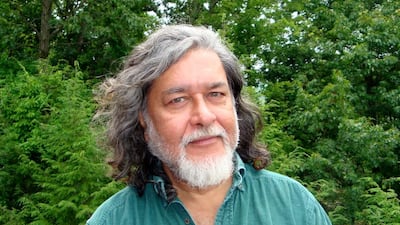"This is a story for anybody who stepped out of home and left for some place else." Kalyan Ray, an Indian-American writer who was born in the Ganges Delta, grew up in Kolkata and left for America, is talking about his second novel No Country, a narrative born of his own experience. "Anyone who has done something like that – well, I would say we are all heroes, all part of this great story of diaspora."
Ray himself was uprooted from what is now Bangladesh amid riots, political upheaval and aching poverty before arriving in Kolkata virtually penniless. It means migration is at the very heart of his being – that he is now being interviewed from New Jersey, where he is a professor of literature, still seems like a minor miracle to the writer, who is the husband of the award-winning Indian filmmaker and actor Aparna Sen.
Yet No Country isn't quite the book one might expect from a writer who jokes that he has seen an incredible amount of change "in my 119 years". It might begin with an Indian couple found dead in modern, upstate New York, but the very next chapter goes back in time to 1840s Ireland, where tax men are burning the houses of people who have fallen into arrears with their rent. It transpires, over the course of the narrative, that the murder in 1989 was two centuries in the making.
“I have always been fascinated by the common heritage the Indians and Irish have of English rule,” he explains. “It doesn’t matter where you’re from, you hang on to the thin thread of ancestry you have to the point where it defines you: if you ask young Bengalis in contemporary India where they are from, they would always say places in Bangladesh. And I find that really interesting: we always refer to places that are far away and, in some cases, unreachable.”
Interestingly, the sections in Ireland are actually the most vivid; his characters labouring through a grimy, gritty existence. The professor in Ray certainly enjoyed the research – he says he spent six months reading nothing but mid-19th-century Irish writing to get a proper sense of the era. “I wanted to make sure there was no stereotyping of the Irish. I was instead after the smouldering anger of English occupation,” he says.
This combination of narrative with key historical events was, for The National reviewer Erika Banerji, problematic. And it's true that often the seismic history does impinge on Ray's characters just a bit too easily. But she concludes by saying that No Country still manages to engage and certainly Ray is keen that his protagonists wear their history lightly.
"I wanted to build up the reality, thin layer by thin layer," he says. "So, yes, I went into the Jalianwallah Bagh massacre of 1919, partition in 1947 and so on. But I was equally interested in making sure the characters rang true. I felt like I was an actor learning new parts for each of these voices. I guess I saw No Country as an epic where very ordinary characters were crushed into roles they never thought they would have to play."
In the end, despite the shoehorned-in history, No Country is a love story, a murder mystery and a journey of self-discovery for characters such as Robert Aherne, an Anglo-Indian in Kolkata looking for a place he can call home and a sense of identity.
“He never quite finds it – but then, a sense of home is always elusive, I think. But does it actually matter? That’s what I would say to anyone reading this book in the UAE: it takes a great leap of imagination, of faith and of energy to leave your country and work in another, in completely different circumstances. It’s amazing, actually.”
• No Country (Bloomsbury) is out on June 19 on Amazon.
artslife@thenational.ae

